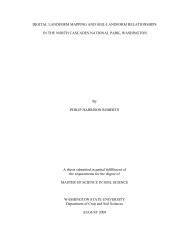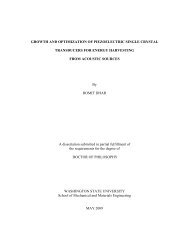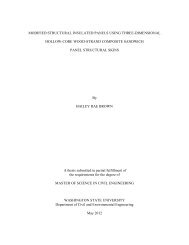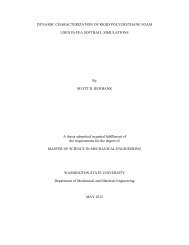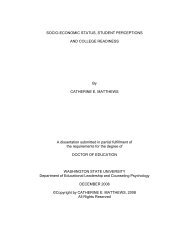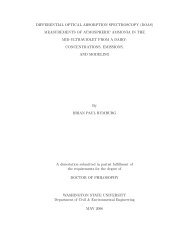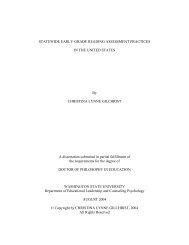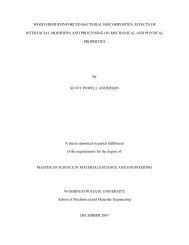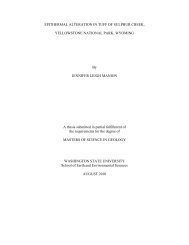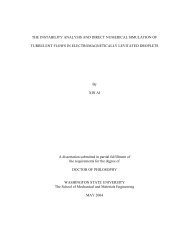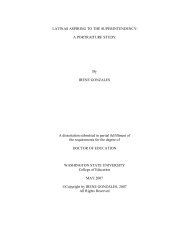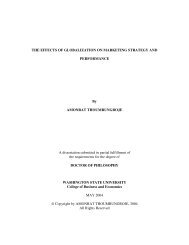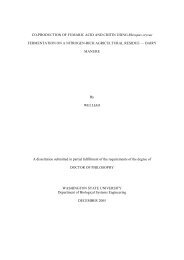the moral reasoning of student athletes and athletic training students
the moral reasoning of student athletes and athletic training students
the moral reasoning of student athletes and athletic training students
Create successful ePaper yourself
Turn your PDF publications into a flip-book with our unique Google optimized e-Paper software.
Taylor-Hanson, in review). However, although a significant differences exist with females<br />
scoring higher than males in <strong>the</strong>se studies, females still do not use a very high level <strong>of</strong> <strong>reasoning</strong><br />
in making decisions. Thus it is <strong>of</strong> interest to examine underlying reasons concerning decisionmaking<br />
<strong>and</strong> whe<strong>the</strong>r males <strong>and</strong> females use <strong>the</strong> same underlying structures to make <strong>moral</strong><br />
decisions.<br />
Moral Reasoning <strong>of</strong> Athletic Training Students<br />
Because intercollegiate sport has become so institutionalized over <strong>the</strong> past 150 years, a<br />
large number <strong>of</strong> coaches, administrators, <strong>and</strong> medical personnel such as <strong>athletic</strong> trainers are<br />
engaged in <strong>the</strong> daily practice <strong>of</strong> sport administration. While much research on <strong>moral</strong> <strong>reasoning</strong><br />
has occurred with athlete populations little in know about <strong>the</strong> <strong>moral</strong> <strong>reasoning</strong> <strong>of</strong> <strong>the</strong>se o<strong>the</strong>r<br />
<strong>athletic</strong>-related populations. Yet, because <strong>the</strong>se individuals help set <strong>the</strong> environment <strong>and</strong><br />
st<strong>and</strong>ards <strong>of</strong> how sport participation should be carried out it becomes important to know more<br />
about how <strong>the</strong>y think <strong>and</strong> reason relative to how higher education institutions <strong>and</strong> <strong>the</strong> NCAA say<br />
sport should be conducted.<br />
Moreover, because one <strong>of</strong> <strong>the</strong> first lines <strong>of</strong> defense against doping at <strong>the</strong> collegiate,<br />
Olympic, <strong>and</strong> pr<strong>of</strong>essional levels should be <strong>the</strong> certified <strong>athletic</strong> trainer, it becomes important to<br />
underst<strong>and</strong> how <strong>athletic</strong> trainers <strong>and</strong> <strong>athletic</strong> <strong>training</strong> <strong>student</strong>s reason about commonly occurring<br />
<strong>and</strong> doping specific issues. While <strong>the</strong> responsibility <strong>athletic</strong> trainers includes <strong>the</strong> prevention <strong>and</strong><br />
care <strong>of</strong> <strong>athletic</strong> injuries, <strong>the</strong>y are <strong>of</strong>ten called upon to deliver information <strong>and</strong> recommendations<br />
about a variety <strong>of</strong> substances to curious, driven <strong>athletes</strong>. Additionally as <strong>the</strong> result <strong>of</strong> <strong>the</strong>ir<br />
relationships with <strong>athletes</strong>, certified <strong>athletic</strong> trainers may be in <strong>the</strong> best position to provide<br />
counsel <strong>and</strong> may be one <strong>of</strong> <strong>the</strong> first to suspect if an athlete is doping. However, recently<br />
researchers have raised concerns about <strong>the</strong> ability <strong>of</strong> certified <strong>athletic</strong> trainers to reason from a<br />
33



